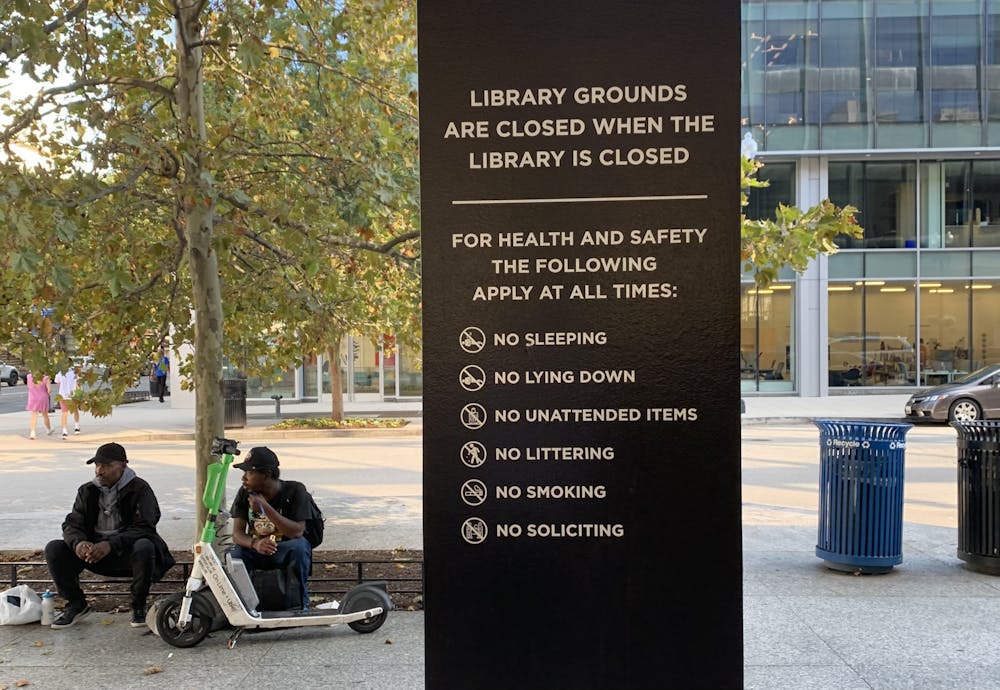For 15 of his 23 years in D.C., Lou Potter has spent his nights sleeping outside the Martin Luther King Jr. Memorial Library with his mini pit bull, Tubaloo. After the recent enforcement of a ban on sleeping on library property, Potter now spends his nights sleeping in the woods near the Washington City Canal Outfall.
On Aug. 20, the MLK Library in downtown D.C. began enforcing the sleeping ban on library property, which has long-existed in the library’s rules of behavior. This recent enforcement involves police presence and security patrols, altering the lives of the homeless population that previously relied on the library as a refuge.
Potter and his friend, James Smith, heard of the ban enforcement through flyers that many sleeping on the premises received at the beginning of August. For Potter and Smith, the library has become an appealing place to spend time due to the access to Wi-Fi and the location, being close to two soup kitchens — So Others Might Eat and Downtown Day Services Center — as well as good access to transportation to the rest of the city.
“As long as there’s no damaging property, I think we should be able to sleep out here,” Smith said.
The library’s rules of behavior have considered sleeping or lying down on the library premises a violation that will result in removal for first-time offenders over the age of nine, since 2014. However, these rules had not been enforced by the Office of Safety — officers who patrol the premises at night — until Aug. 20.
D.C. Public Library Media Relations Manager, George Williams, did not cite any specific instances that led to the ban enforcement but said the enforcement is a means to address health and safety concerns, such as violence, drug use, unsanitary conditions and medical emergencies.
“The D.C. Public Library is not equipped to provide a healthy and safe environment for sleeping and long-term sheltering,” Williams said.
However, to those who grew accustomed to the library as a place providing shelter, like Potter, the ban is another obstacle to finding a safe place to sleep. Since the ban enforcement has begun, Potter leaves the library at night and retreats to his tent in the woods, then early in the morning he returns to the library in an attempt to evade security guards, often unsuccessfully.
Earlier in the month, Potter said security officers tried to take his dog as they claimed people experiencing homelessness couldn’t have a service dog. For Potter, he said his dog is not only his best friend but a key player in how he earns money through panhandling. The altercations eventually led to him being banned from the library, a decision that doesn’t hold much weight to Potter now.
“For 15 years they didn’t care as long as there were no altercations,” Potter said. “But there’s been a lot of fights around here and that’s why they stopped letting us sleep.”
Potter and Smith still spend their time outside the library together, although they wish it was more accommodating to their needs. Potter said violence between homeless people sleeping outside the library was the reason for the ban enforcement.
Smith, on the other hand, said theft was a primary factor. On Oct. 6, Smith said a woman who had her stuff stolen began to question and pick fights with all others nearby.
To address the needs of individuals affected like Potter and Smith, Williams highlighted the DCPL-sponsored WeCare Peer Support Program. Partnering with local non-profits, homeless advocacy groups and government agencies, the program focuses on connecting people experiencing homelessness to housing resources.
Services provided by the team include assistance with receiving an ID and other vital documents, help with returning to the community after time in jail or prison, help connecting to housing and other services because of partner abuse or domestic violence and assistance in search for work or housing.
While the program aims to aid the homeless community, people like Potter and Smith, just feet from the library’s premises, find themselves navigating new obstacles in a place they once found refuge.
This article was edited by Mackenzie Konjoyan, Tyler Davis and Abigail Turner. Copy editing done by Luna Jinks, Ariana Kavoossi, Sabine Kanter-Huchting and Ella Rousseau. Fact checking done by Luna Jinks and Hannah Paisley Zoulek.





